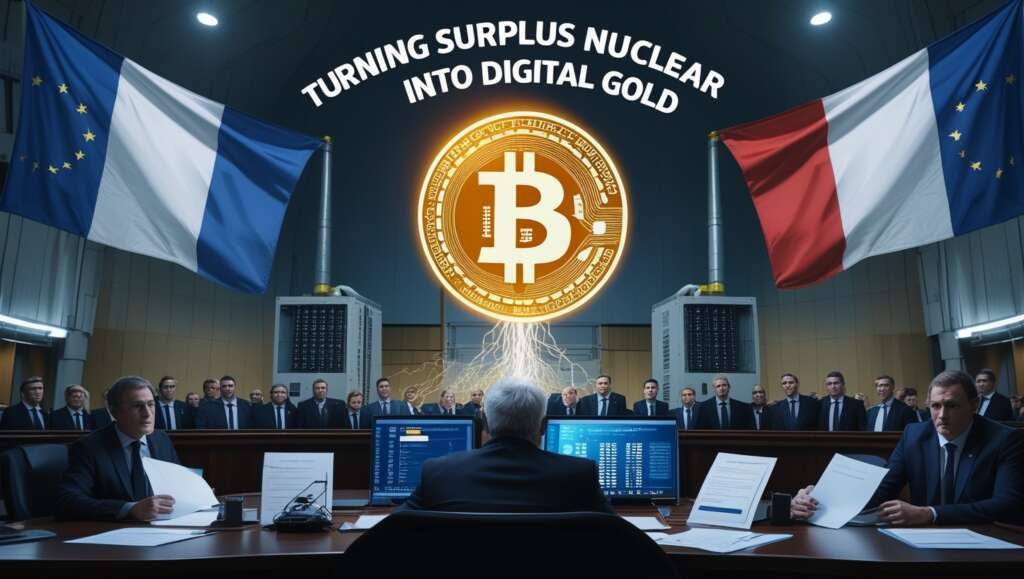Nowadays, cryptocurrencies aren’t just mere digital currencies for transactions – they are becoming a pivotal issue in political campaigns that decide elections. France’s far-right party Rassemblement National, led by former Presidential Candidate Marine Le Pen, is drafting a bill to use surplus nuclear power to mine Bitcoin. The bill proposes a five-year pilot program to use excess electricity for Bitcoin mining, turning unused power into profits.
The proposal highlights the party’s progressive stance on crypto mining, having been an ardent critic of cryptocurrencies. If enacted, France would not only align with global standards in efficient energy management but also become a leader in Bitcoin mining.
What the Proposed Bill Contains
The far-right party proposes rerouting excess nuclear energy into Bitcoin mining. France generates over 70% of its power from nuclear energy, often resulting in excess power during low-demand periods. Electricity producers are forced to sell at a loss or waste output due to limited storage capacity. Le Pen and co. proposes converting this wasted energy into mining, enabling instant consumption and profit generation.
According to the Association for the Development of Digital Assets (ADAN), utilizing 1 GW of surplus energy for crypto mining could generate up to $150M annually in revenue. This will help offset maintenance of the aging infrastructure, as well as handle other costs. Le Pen also suggests the use of mining farms for ramping down power when demand rises and ramping up during oversupply. This’d reduce stress on nuclear reactors considerably, as the farms will bear the load.
The far-right party recommends building mining centers in abandoned industrial zones near nuclear sites. Bitcoin mining can generate sufficient heat, which can be redirected to heating systems and greenhouses. They draw inspiration from Scandinavian countries, such as Finland and Sweden, as among the few countries utilizing the Bitcoin mining heat to support agriculture and other infrastructure.
Finally, the bill proposes a 3-year pilot program, extendable to 5 years based on review. The French Council of State will expect an evaluation after six months to assess the environmental and grid impact.
Le Pen Goes from Critic to Pro Crypto
In 2016, party leader Marine Le Pen called for a ban on cryptocurrencies, labeling them tools of elites and Wall Street. By 2022, she advocated regulation; now, in 2025, her party supports directly producing crypto. She endorsed installing mining rigs on EDF sites to transform unused power into sovereign digital assets. Does that mean she’s changed her perspective on crypto? This dramatic ideological transformation highlights the potential of crypto and blockchain innovation.
But this could be a political maneuver. Remember, many pro-crypto candidates have been winning the elections since last year. Donald Trump, for example, was thorough about crypto policies in his campaign. So far, he has signed a bill to launch a national crypto reserve and passed the GENIUS Act.
Moving to Asia, Lee Jae Myung, won the presidential election partly because of his crypto policies, which captured the youth vote. Experts believe Le Pen’s current stance reflects a broader trend of political repositioning around Blockchain innovation and cryptocurrencies. Her repositioning could clinch the election for her during the next polls.
France and its Crypto Oversight: Caution Plus Innovation
The French government has embraced crypto, but with a more measured approach. France has been supportive of the EU’s regulatory framework, especially MiCA, which it revealed would foster trust, transparency, and stability. However, the country has never resisted innovation, despite its cautious approach.
France has encouraged startups and fintechs to enter the crypto and Web3 space. So far, the country has attracted several institutional players and firms to develop Blockchain applications under clear regulations.
What to Watch Next?
The bill will await approval in the National Assembly, but DIQ experts expect strong opposition. Some lawmakers who are environmental critics may argue that nuclear energy is intensive and could damage the environment if demand skyrockets. They may suggest other alternatives, such as green energy, which might deliver more public benefit.
Even if enacted, a feasibility report must be available after 6 months. The final report will shape extension decisions. If underwhelming, the pilot program could stop. If impressive, France could achieve economic independence from the EU, as Bitcoin mining will guarantee energy sovereignty and autonomy. Furthermore, jobs will be created, which strengthens the economy.




